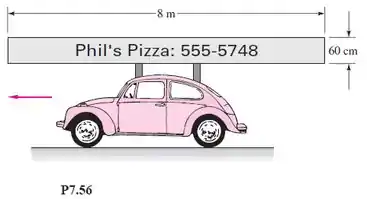Um veículo de entregas transporta um longo letreiro sobre o topo, como na Figura P7.56. Se o letreiro for muito fino e o veículo se mover a 105 km/h, (a) estime a força sobre o letreiro sem vento lateral e (b) discuta o efeito de um vento lateral.

Passo 1
E bora lá!
Cara, temos que pro ar e . Convertendo nossa velocidade, teremos que . Assim, bora ver a força sobre o letreiro sem o vento lateral, temos por Reynols
Turbulento!
Assim, nosso coeficiente de arraste:
Logo, a força de arraste:
Passo 2
O vento lateral vai causar uma grande força lateral, maior que o arrasto sobre a placa. Vamo considerar um vento de 29 m/s, aproximadamente a velocidade do carro, com um ângulo de 5°! Pela Eq. (7.70), teremos:
Assim, a força de um vento lateral:
Resposta
- 14 N
- 50 N